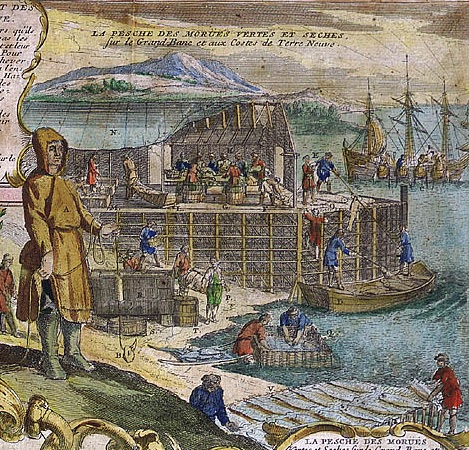I had lost this book. I found it again yesterday. The precursors of Jacques Cartier, 1497-1534: a collection of documents relating to the early history of the Dominion of Canada. Notice that it is a book published under the authority of the Canadian Federal Minister of Agriculture published by the Government Printing Bureau in Ottawa in 1911. We really used to know how to do government right.
Attentive readers will recall last March’s post in which I speculated on who might actually have been the first brewer in New France. A year earlier I wrote about the masses of beer transported along with the English Arctic iron ore mining mission led by Martin Frobisher in the 1570s. This is half a century earlier and might at least exemplify the earliest sort of alcohol use in North America – cider. Newfoundland is an obvious candidate. I suspect West Country fishermen drying cod for the summer caught on the Grand Banks were brewing at their coastal camps in the late 1500s. In the early 1600s they were clearly using beer and aqua vitae. So, its pretty much obvious that the earliest crews were enjoying strong drink in their earliest voyages as this record from 1520 shows:
To My Lord the Lieutenant of My Lord the Mayor, Sheriffs and Notable Council of Bayonne:
Messrs. Michael de Segure and Matthew de Biran make humble petition, setting forth that they have decided, at God’s pleasure, to send their vessel as far as Newfoundland to fish, and they need a large quantity of provisions, and among other things the number and quantity of forty butts of cider, of the best that can be found. And this being so, that the said de Segure has an orchard on his farm at St. Stephen, which is worked at his expense and from this he has a certain amount of cider; and also the said de Biran has certain debts at Seinhanx, for which he is willing to take payment in cider. In consideration of this, the said petitioners beg, supplicate and ask that you will be pleased to grant them permission, by special favour and without prejudice to the regulations of the said city, to load on board the said vessel forty butts of outside cider, part from the farm of the said de Segure and the surplus from Seinhanx, for the provision and victualling of the said vessel ; and you will be doing well.
Signed : M. de Biran.
The present request having been read and considered here in council, it has been ordered that the said petitioners, after they have taken oath before My Lord the Lieutenant, shall be allowed and permitted to load cider in their said vessel for the provisioning of the same, half the amount necessary thereto being grown in the city, and the other half being that belonging to the said petitioners. And this by special favour, in consideration of the voyage the said vessel is to make, and without prejudice to the regulations of the city making mention of wines and ciders, and to other restrictions and edict of the king, our lord, relating to the ports, loading and unloading. And should they be found doing the contrary, they will incur a fine of one hundred livres tournois, to be applied to the affairs of the city.
Given in council, 6 March, 1520.
Bayonne is a port town on the Atlantic coast just north of the French-Spanish border. You seem to be able to get cider and cod fish tapas there still. Early relations on the Canadian coast appear to have been friendly, Mi’kmaq chiefs joining them on the return trip over wintering in Europe on occasion. Crews from Bayonne had been sailing long distances for centuries before this request for cider was made. The Grand Banks cod fishery continued for decades after, well before settlement attempts. Strong drink would have accompanied them throughout the centuries. We even had a fish war with Spain in the 1990s. That image up there? It’s actually from 178 years after M. de Segure and M. de Biran set out with their 40 butt in the hold – according to the Government of Canada website where I found it. Hey. We still do this stuff through government action.
So… what is outside cider? I have no idea.

